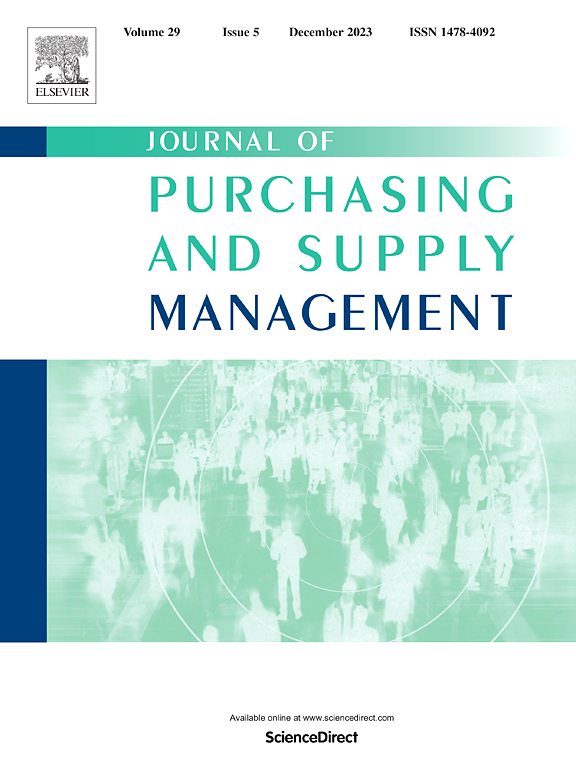Dynamic tensions in supply chain collaboration: The role of organizational capabilities in advancing the circular economy
IF 8.7
2区 管理学
Q1 MANAGEMENT
引用次数: 0
Abstract
This study examines how absorptive capacity (ACAP) and strategic sensitivity (SSENS) jointly influence supply chain collaboration (SCC) to enhance circular economy (CE) performance. While organizational learning and collaborative practices are recognized as important drivers for CE, the combined effect of these capabilities within SCC remains insufficiently explored. Using survey data from Italian manufacturing and construction firms, we find that ACAP and SSENS play distinct yet complementary roles in supporting SCC. Their interplay generates a synergistic dynamic, balancing external market insights with internal knowledge creation, thereby enhancing collaboration through mechanisms such as communication, shared goals, and joint knowledge creation. However, this synergy does not extend to resource- and incentive-based collaboration, where SSENS alone proves inadequate, resulting in a compensatory role for ACAP. Additionally, contrary to previous assumptions in the literature, SCC does not mediate the relationship between ACAP and CE performance, suggesting that internal capabilities independently contribute to CE achievements. The results underscore the need for nuanced integration of organizational capabilities in SCC strategies and provide practical insights for managers and policymakers aiming to align capability development with sustainability objectives.
供应链协作中的动态张力:组织能力在推进循环经济中的作用
本研究探讨了吸收能力(ACAP)和战略敏感性(SSENS)如何共同影响供应链协作(SCC)以提高循环经济(CE)绩效。虽然组织学习和协作实践被认为是CE的重要驱动因素,但这些能力在SCC中的综合影响仍然没有得到充分的探索。利用意大利制造和建筑公司的调查数据,我们发现ACAP和SSENS在支持SCC方面发挥着不同但互补的作用。它们的相互作用产生了一种协同动力,平衡了外部市场洞察和内部知识创造,从而通过沟通、共同目标和共同知识创造等机制加强了协作。然而,这种协同作用不能扩展到基于资源和激励的合作,在这种合作中,单靠SSENS证明是不够的,因此ACAP发挥了补补性作用。此外,与文献中先前的假设相反,SCC并没有中介ACAP和CE绩效之间的关系,这表明内部能力独立地促进了CE成就。研究结果强调了在SCC战略中细致入微地整合组织能力的必要性,并为旨在将能力发展与可持续性目标结合起来的管理者和决策者提供了实用的见解。
本文章由计算机程序翻译,如有差异,请以英文原文为准。
求助全文
约1分钟内获得全文
求助全文
来源期刊

Journal of Purchasing and Supply Management
MANAGEMENT-
CiteScore
10.30
自引率
18.00%
发文量
31
审稿时长
70 days
期刊介绍:
The mission of the Journal of Purchasing & Supply Management is to publish original, high-quality research within the field of purchasing and supply management (PSM). Articles should have a significant impact on PSM theory and practice. The Journal ensures that high quality research is collected and disseminated widely to both academics and practitioners, and provides a forum for debate. It covers all subjects relating to the purchase and supply of goods and services in industry, commerce, local, national, and regional government, health and transportation.
 求助内容:
求助内容: 应助结果提醒方式:
应助结果提醒方式:


